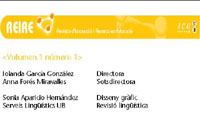Virtual communities for continuing in-service teacher training
DOI:
https://doi.org/10.1344/reire2008.1.1111Keywords:
Virtual communities, practice communities, continuing in-service training, digital citizenship, citizen educationAbstract
Social networks, which are increasingly present on the Internet, have demonstrated the importance of a new form of social organisation through networking. Digital networks create new communities that are not dependent on physical or spatiotemporal territories. These are new spaces, new media and new forms of knowledge communication and production that make it necessary to rethink the training and professional development of teachers and educators. The challenge in the coming years is not mainly about access to the Internet, but about educating citizens so they are capable of learning and contributing through it. Virtual learning and practising communities have great potential for continuing in-service teacher training.References
AREA, M., GROS, B Y MARZAL, M. A. (2008). Alfabetizaciones y Tecnologías de la Información y Comunicación. Madrid: Síntesis.
CARNEIRO, R. (2007). La “nueva educación” en la sociedad de la información y de los saberes. En AA.VV. Las tecnologías de la información y la comunicación (TIC) en la educación: retos y posibilidades. Madrid: Santillana.
DE LA TORRE, A. (2007). El complejo de Mark Prensky, [En línea] A Bitácora de Aníbal de la Torre [consulta, 28-10-2008]. <http://www.adelat.org)>
EUROPEAN COMISSION. (2007), Eurobarometer on Safer Internet for Children: qualitative study 2007. [En línia] [consulta, 27-10-2008] <http://ec.europa.eu/information_society/activities/sip/docs/eurobarometer/qualitative_study_2007/summary_report_en.pdf>
GANNON-LEARY, P. (2007). Communities of practice and virtual learning communities: benefits, barriers and success factors. Technical University of Lisbon: Portugal.
HENRI, F. Y PUDELKO, B. (2003). Understanding and analysing activity and learning in virtual communities. Journal of Computer Assisted Learning, 19(4), 472-487.
LAVE, J. Y WENGER, E. (1991) Situated Learning. Legitimate Peripheral participation. Cambridge: Cambridge University Press.
MARCELO, C. (2002). La formación inicial y permanente de los educadores. En AA.VV. Los educadores en la sociedad del siglo XXI. Madrid: Ministerio de Educación, Cultura y Deporte, pp. 161-194.
PRENSKY, M. (2001). Digital Natives, digital inmigrants. On the Horizon, 9 (5).
RIEL, M. Y POLIN, L. (2004). OnLine Learning Communities : Common Ground and Critical Differences in Designing Technical Environments. En S.A. Barab et al (Eds). Designing Virtual Communities in the Service of Learning. New York: Cambridge University Press, 16-50.
SELWYN, N (2004). Literature Review in Citizenship, Technology and Learning. Bristol: Futurelab.
TAPSCOTT, D. (1998). Growing up digital. McGraw- Hill.
UCL-CIBER GROUP (2008). Information Behaviour of the Researcher of the Future. [En línia] University College London CIBER Group, [consulta, 4-3-2008] <http://jisc.ac.uk/>
WENGER, E. (2001). Comunidades de práctica. Aprendizaje, significado e identidad. Barcelona: Paidós.
Downloads
Published
How to Cite
Issue
Section
License
Authors keep authorship rights and confer to REIRE the rights of article’s first publication.
All the contents included into REIRE Revista d’innovació i Recerca en Educació are under Creative Commons 4.0 International license attribution, which allows the article’s reproduction, distribution and public communication, whenever authorship and the journal’s title is quoted.







